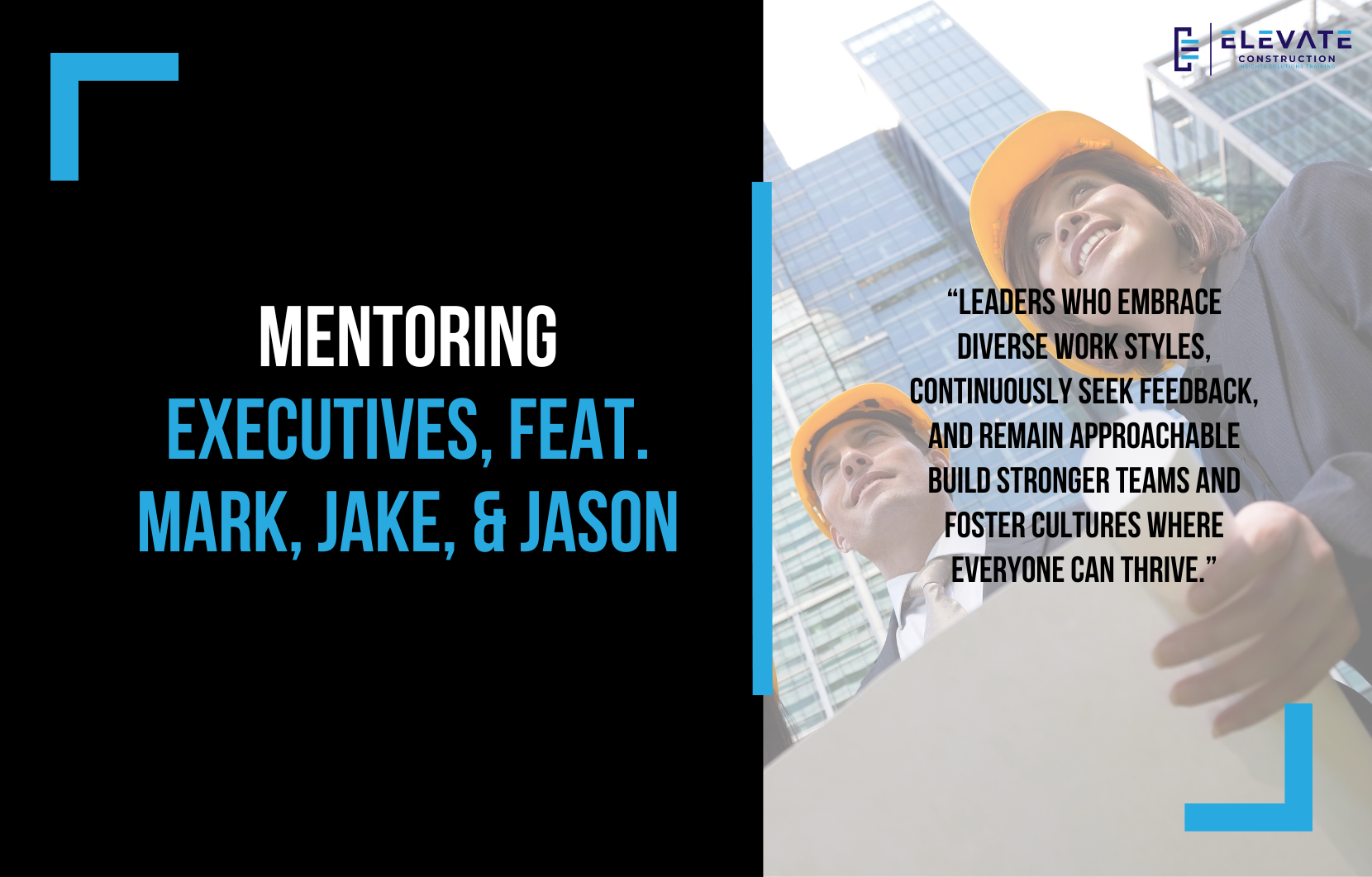Mentoring Executives: Elevating Leadership in Construction
Mentoring is often discussed in relation to supervisors, project managers, or engineers, but what about executives? This blog features Mark Story, Jake Smalley, and Jason Schroeder as they explore the importance and nuances of mentoring at the executive level within construction leadership.
Genuine Mentorship Beyond Titles
Mark opens with humility, reminding us that mentoring isn’t about doing it perfectly but about consistent effort and openness. He welcomes accountability, encouraging peers to call him out when he falls short, which exemplifies the true spirit of mentorship.
Jake shares how Mark’s mentorship went beyond formal coaching. Even after the official relationship ended, Mark continued reaching out with calls and emails a testament to authentic, long-lasting mentorship grounded in genuine care.
Jason reflects on his friendly, respectful dynamic with Mark and Jake, underscoring that strong mentorship flourishes through trust, humor, and open communication.
Coaching Executives: Breaking Down Silos and Embracing Individuality
Mark highlights a persistent industry challenge: the division between office and field teams. He stresses that everyone’s contributions matter equally and that collaboration not competition over who is “right” is key to success.
He recounts a story of a superintendent who didn’t fit the traditional mold but delivered outstanding work. Unfortunately, some executives struggled to accept his unconventional approach. This scenario reveals how leadership sometimes limits potential by clinging to outdated expectations rather than valuing results and individuality.
Jake relates this to lessons learned at Lean Tack and Elevate, emphasizing that “square pegs” don’t have to fit “round holes” to contribute meaningfully. Drawing from Paul Eakers’ Banish Sloppiness, he points out that working “in harmony” with the team’s goals is what truly matters, not conformity.
Leadership is Continuous Learning
Jason shares a revealing experience from a leadership book group, where top executives remain humble and hungry to learn. This willingness to listen and grow is what separates great leaders from the rest.
He also recounts receiving candid feedback during a leadership meeting from communication style to emotional regulation underscoring the importance of actively seeking and embracing feedback to improve.
The Art of Authentic Feedback and Coaching
Mark and Jake discuss the challenge of delivering honest, respectful feedback in construction, where workers appreciate straightforwardness paired with compassion. They emphasize avoiding “philosophical” or insincere comments, instead aiming for real talk that helps people grow.
They dive into the concept of “sidecar” coaching a process where a secondary coach observes sessions and supports the primary coach by providing feedback afterwards. When done correctly, this approach strengthens mentorship and ensures accountability.
Jason even put their discussion through ChatGPT to extract best practices, which included ideas like:
- Flipping the mentorship funnel to coach up the chain
- Implementing structured executive 360 reviews
- Creating reverse mentorship pairings
- Inviting executives to attend boot camps as learners
- Measuring executive performance beyond financials (e.g., trust, engagement, culture)
- Building bridges between field teams and boardrooms
- Normalizing vulnerability among leadership
Executives: Build Your Brand Through Approachability
Mark challenges executives to spend more time out in the field, beyond financial reviews, to build trust and stay connected with their teams. When leaders are approachable and engaged, they receive valuable feedback that can lead to meaningful improvements.
Jake adds that executives often get put on pedestals, which creates barriers for honest communication. Leaders must ask for feedback actively to create a safe space for their teams to speak openly.
Jason shares a powerful metaphor from the book The Captain Class: the best team captains are not necessarily the stars but the dedicated, loyal players who support and lift their teammates. Executives should aim to be these “team captains” those who encourage, mentor, and support their teams with unwavering commitment.
Key Takeaway:
Effective mentoring of executives requires authenticity, humility, and intentional collaboration. Leaders who embrace diverse work styles, continuously seek feedback, and remain approachable build stronger teams and foster cultures where everyone can thrive. True leadership is less about fitting a mold and more about being the team captain who supports and inspires their crew to win together.
If you want to learn more we have:
-Takt Virtual Training: (Click here)
-Check out our Youtube channel for more info: (Click here)
-Listen to the Elevate Construction podcast: (Click here)
-Check out our training programs and certifications: (Click here)
-The Takt Book: (Click here)
Discover Jason’s Expertise:
Meet Jason Schroeder, the driving force behind Elevate Construction IST. As the company’s owner and principal consultant, he’s dedicated to taking construction to new heights. With a wealth of industry experience, he’s crafted the Field Engineer Boot Camp and Superintendent Boot Camp – intensive training programs engineered to cultivate top-tier leaders capable of steering their teams towards success. Jason’s vision? To expand his training initiatives across the nation, empowering construction firms to soar to unprecedented levels of excellence.
On we go

